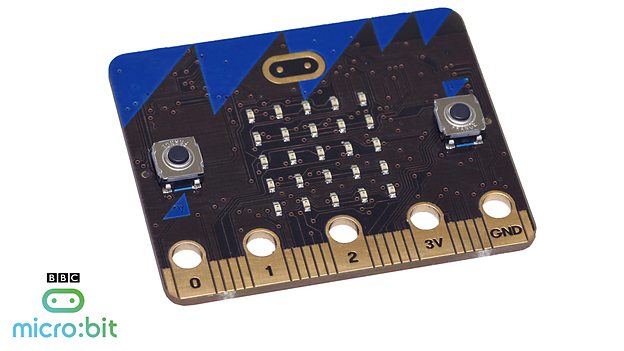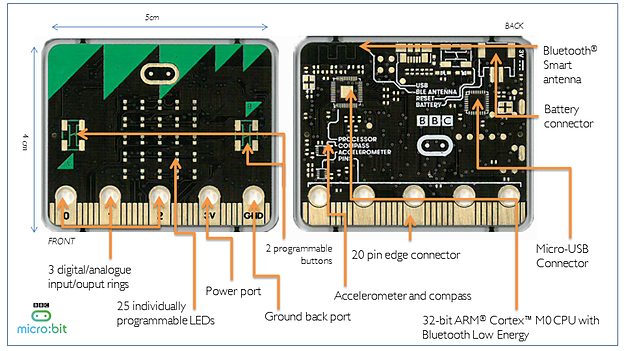BBC, ARM, Others Giving micro:bit Board To UK Children For Free
The BBC, along with ARM, Freescale and Samsung, released a tiny computer aimed at 11- and 12-year-olds that's designed to get them interested in technology and programming at a young age. It's called the BBC micro:bit, and it allows the user to display information using its 25 LEDs or use it as a controller for other devices.
It measures about 1.9 x 1.5 inches and weighs about 0.2 ounces. The small board is powered by a 32-bit ARM Cortex M0 processor. The 25 LEDs are arranged in a 5x5 grid and can be used to display animations, scrolling text and alphanumeric characters. Each LED can also be programmed to be individually lit. It also has two small buttons to flank the LED grid, and they can be programmed to be used as a controller for custom games or even as a remote for other devices.
Additional features include Bluetooth Smart Technology, which allows wireless communication with other devices, but you can also have wired connections thanks to the microUSB port, which allows you to transfer programs onto the board. It also comes with a compass and accelerometer, as well as five I/O rings at the bottom to allow for even more connections to other devices via crocodile clips or 4 mm banana plugs. The I/O rings share the same space as the 20-pin edge connector, which allows the BBC micro:bit to work with other small devices such as the Raspberry Pi.
The board is programmed through web-based software, which contains an editor that accepts multiple languages such as JavaScript, Python, C++, Blocks and Touch Develop from Microsoft.
The BBC and its many partners will offer up to one million boards to 11- and 12-year-olds in the UK -- for free. The initiative is considered to be the follow-up to the BBC Micro, which was first introduced to children in the 1980s.
By starting with a small device, children can easily carry it around and use it to program devices both at home and in school. The hope is that it becomes a gateway to more curiosity about technology that carries on to adulthood.
Follow Rexly Peñaflorida II @Heirdeux. Follow us @tomshardware, on Facebook and on Google+.
Get Tom's Hardware's best news and in-depth reviews, straight to your inbox.
Rexly Peñaflorida is a freelance writer for Tom's Hardware covering topics such as computer hardware, video games, and general technology news.
-
mapesdhs This board is not, in any way conceivable, a followup to the BBC Micro. Totally different environment back then. However, the idea is good I suppose, though perhaps they should release a single-chip Beeb aswell. Would be a laugh linking them up, and there's also a vast lib of sw & code for the Beeb, thousands of mags online & print. Allow youngsters to meddle with modern tech while crossing over with what came before. I talked to a guy who was annoyed that he'd missed the 80s home computer boom because he wasn't born until 1990.Reply
Ian.
-
turkey3_scratch I like it, there are certain children who this stuff would interest. Not everyone is one of those kids who pick their nose, put it into his or her mouth, and then say "this sucks I want a football". For instance, there is Scratch which introduces kids to programming, and you find people as young as 8 even or younger on there who have an interest in programming. I just feel that, why learn to program with this? There are better, more fun options already on the Internet.Reply -
mapesdhs It's free, and if it can grab the attention of at least some of the young & bring them into the world of computing and electronics, then all the better. Worth a try. Especially in an age when everything is more black-box than ever before.Reply
Ian.

